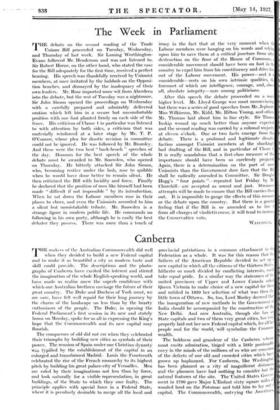The Week in Parliament
THE debate on the second reading of the Trade Unions Bill proceeded on Tuesday, Wednesday, and Thursday of last week. Sir Laming Worthington- Evans followed Mr. Henderson and was not listened to. Sir Robert Horne, on the other hand, who stated the case for the Bill adequately for the first time, received a perfect hearing. His speech was thankfully-received by Unionist members, at once irritated by the hubbub on the Opposi- tion benches, and dismayed by the inadequacy of their own leaders. Mr. Rose imported some wit from Aberdeen into the debate, but the rest of Tuesday was a nightmare. Sir John Simon opened the proceedings on Wednesday with a carefully prepared and admirably delivered oration which left him in a secure but uncomfortable position with one foot planted firmly on each side of the knee. His criticism of Clause 1 in particular was listened to with attention . by both sides, a criticism that was materially reinforced at a later stage by Mr. T. P. O'Connor, whose plea for drastic revision in committee could not be ignored. He was followed by Mr. Bromley. And these were the two best " back-bench " speeches of the day. Honours for the. best speech of the whole debate must be awarded to Mr. Snowden, who opened on Thursday. He bitterly attacked Sir John Simon, who, becoming restive under the lash, rose to quibble when he would have done better to remain silent. He then criticized the Bill with lucidity and force. , Finally he declared that the position of men like himself had been made " difficult if not impossible " by its introduction. When he sat down the Labour members rose in their places to cheer, and even the Unionists accorded to him a silent but unmistakable tribute. Mr. Snowden is a strange figure in modern public life. He commands no following in his own party, although he is easily the best debater they possess. There was more than a touch of irony in the fact that at the very moment when th Labour -members were hanging on his words- and relyin upon him to save them at a critical juncture from utter destruction on the floor of the House of Commons, a considerable movement should have been on foot in tl country to expel him from his constituency and- drive his out of the Labour movement. - His power—and it is conSiderable—rests on his own intrinsic qualities, ti foremost of -which are intelligence,- courage, and, above all, absolute integrity—rare among politicians.
After this speech the debate proceeded on a much higher level. Mr. Lloyd George was most unconvincing, but there was a series of good speeches from lir; Jephcott Miss Wilkinson, Mr. Kidd; Mr. Hilton Young, and others. Mr. Thomas laid about him in fine style; Sir Thomas Inskip wound up much better than anyone expected, and the second reading was carried by a colossal majority at eleven o'clock. One or two facts emerge from this debate. There is a profound and legitimate dissatis• faction amongst Unionist members at the shockingly bad drafting of the Bill, and in particular of Clause 1 It is really scandalous that a first-class measure of this importance should have been so carelessly prepared. Again, there is a determination on the part of more Unionists than the Government dare face that the Bill shall be radically amended in Committee. Sir Douglas Hogg's " four points "—repeated last Friday by 31r. Churchill—are accepted as sound and just. Strenuous attempts will be made to ensure that the Bill carries then out. It is impossible to gauge the effects .of this measure or the debate upon the country. - But there is a gcuer.rl feeling that if the Bill is , so amended as to free it from all charges of vindictiveness; it will tend to increase the Conservative vote.
WATCHMAN.


























































 Previous page
Previous page